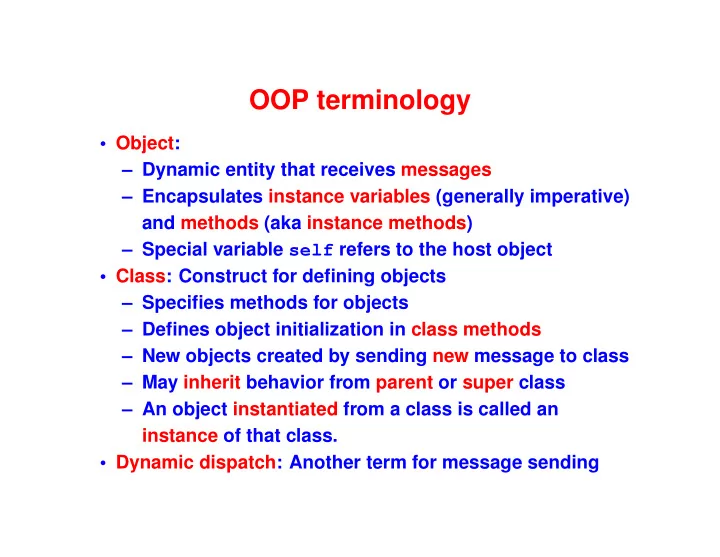

OOP terminology • Object: – Dynamic entity that receives messages – Encapsulates instance variables (generally imperative) and methods (aka instance methods) – Special variable self refers to the host object • Class: Construct for defining objects – Specifies methods for objects – Defines object initialization in class methods – New objects created by sending new message to class – May inherit behavior from parent or super class – An object instantiated from a class is called an instance of that class. • Dynamic dispatch: Another term for message sending
Example: List select (aka filter) -> (val ns (List withAll: ’(1 2 3 4 5))) List( 1 2 3 4 5 ) -> (ns select: [block (n) ((n mod: 2) = 0)]) List( 2 4 ) Vocabulary notes: • List is a class • withAll is a class method – It encapsulates a use of new • ns is an object and an instance of class List • ns is sent the message select • select is an instance method of class List • Bonus: block construct analogous to lambda
Design process in an OO setting No interrogation about form! Design process still works 1. Each method defined on a class • The class knows the form! 2. Class determines • How object is formed ( class method ) • From what parts ( instance variables ) • How object responds to messages ( instance method ) Each form of data gets its own methods in its own class!
Using classes to implement select Class determines how object responds. Key classes in lists: • class Cons : instance is cons cell with car and cdr instance variables • class ListSentinel : an instance denotes end of list (method select: (_) self) ;; on ListSentinel (method select: (aBlock) ;; on Cons ([aBlock value: car] ifFalse:ifTrue: {(cdr select: aBlock)} {(((Cons new) car: car) cdr: (cdr select: aBlock))}))
Dynamic dispatch replaces if In OOP, conditionals are deprecated Instead, idiomatic code uses dynamic dispatch. We’ll expore via example: List filtering via iteration • Uses imperative idioms (common in OOP)
Functional iteration: Forms of data Iteration in Scheme: ask value about form (define app (f xs) (if (null? xs) ’do-nothing (begin (f (car xs)) (app f (cdr xs)))))
Object-oriented iteration: Dynamic dispatch Instead of (app f xs), we have (xs do: f-block) For each element x in xs send (f-block value: x)
Example: Iteration -> (val ms (ns select: [block (n) ((n mod: 2) = 0)])) List( 2 4 ) -> (ms do: [block (m) (’element print) (space print) (’is print) (space print) (m println)]) element is 2 element is 4 nil
Implementing iteration What happens if we send “do f” to an empty list? What happens if we send “do f” to a cons cell?
Iteration by dynamic dispatch Sending do: to the empty list: (method do: (aBlock) nil) ; nil is a global object Sending do: to a cons cell: (method do: (aBlock) (aBlock value: car) (cdr do: aBlock)) Look! No if! Decisions made by dynamic dispatch
The six questions 1. Values are objects (even true , 3, "hello" ) Even classes are objects! There are no functions—only methods on objects
The six questions 2. Syntax: • Mutable variables • Message send • Sequential composition of mutations and message sends (side effects used commonly) • “Blocks” (objects and closures in one, used as continuations) • No if or while . Functionality implemented by passing continuations to Boolean objects.
Syntax comparison: Impcore Exp = LITERAL of value | VAR of name | SET of name * exp | IF of exp * exp * exp | WHILE of exp * exp | BEGIN of exp list | APPLY of name * exp list
Syntax comparison: Smalltalk Exp = LITERAL of rep | VAR of name | SET of name * exp | IF of exp * exp * exp | WHILE of exp * exp | BEGIN of exp list | APPLY of name * exp list | SEND of exp * name * exp list | BLOCK of name list * exp list
Syntax comparison: Smalltalk Exp = LITERAL of rep | VAR of name | SET of name * exp | IF of exp * exp * exp | WHILE of exp * exp | BEGIN of exp list | APPLY of name * exp list | SEND of exp * name * exp list | BLOCK of name list * exp list
The six questions 3. Environments • Name stands for a mutable cell containing an object: – Global variables – Instance variables
The six questions 4. Types There is no compile-time type system. At run time, Smalltalk uses behavioral subtyping, known to Rubyists as “duck typing” 5. Dynamic semantics • Main rule is method dispatch (complicated) • The rest is familiar 6. The initial basis is enormous • Why? To demonstrate the benefits of reuse, you need something big enough to reuse.
Recommend
More recommend